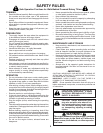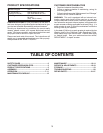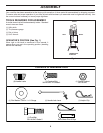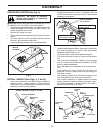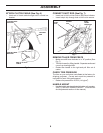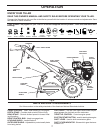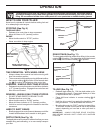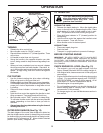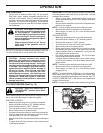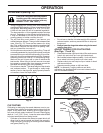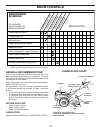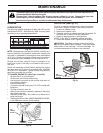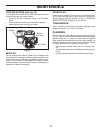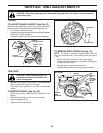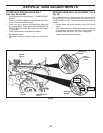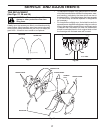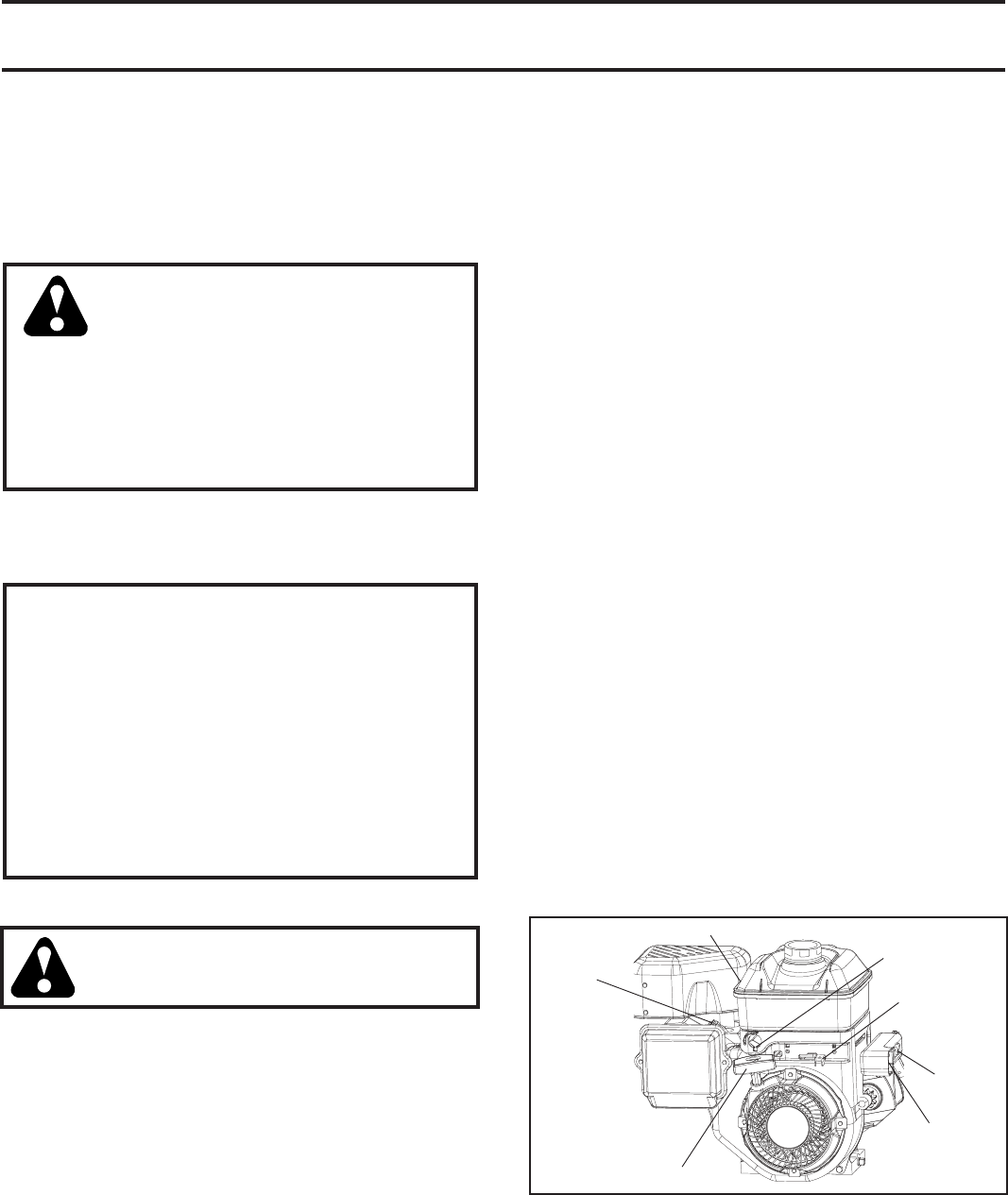
10
OPERATION
ADD GASOLINE
• Fill fuel tank to bottom of filler neck. Do not overfill.
Use fresh, clean, regular un lead ed gasoline with a
minimum of 87 octane. (Use of leaded gasoline will
increase carbon and lead oxide deposits and reduce
valve life). Do not mix oil with gasoline. Purchase fuel
in quan ti ties that can be used within 30 days to assure
fuel freshness.
CAUTION: Fill to within 1/2 inch of top
of fuel tank to prevent spills and to allow
for fuel expansion. If gasoline is ac-
ci den tal ly spilled, move machine away
from area of spill. Avoid creating any
source of ignition until gasoline vapors
have disappeared.
Wipe off any spilled oil or fuel. Do not
store, spill or use gasoline near an
open flame.
IMPORTANT: WHEN OPERATING IN TEMPERATURES BELOW
32°F (0°C), USE FRESH, CLEAN WINTER GRADE GAS O LINE
TO HELP INSURE GOOD COLD WEATHER START ING.
CAUTION: Alcohol blended fuels (called
gas o hol or using ethanol or methanol) can at-
tract moisture which leads to sep a ra tion and
for ma tion of acids during storage. Acidic gas
can damage the fuel system of an engine while
in storage. To avoid engine problems, the fuel
system should be emptied before stor age of
30 days or longer. Drain the gas tank, start
the engine and let it run until the fuel lines
and carburetor are empty. Use fresh fuel next
sea son. See Storage In struc tions for additional
information. Never use engine or carburetor
cleaner products in the fuel tank or permanent
damage may occur.
Fig. 14
TO START ENGINE (See Fig. 14)
CAUTION: Keep drive control bar in
“DISENGAGED” position when start-
ing en gine.
When starting engine for the first time or if engine has run
out of fuel, it will take longer to start the engine.
ELECTRIC STARTER
• Make sure spark plug wire is prop er ly connected.
• Move shift lever indicator to “N” (neutral) position.
• Place throttle control in “FAST” position.
• Turn fuel shut-off valve 1/4 turn to open position.
• Move choke control to choke position.
• Connect a three-wire extension cord to the engine first.
• Plug the other end of the extension cord into a three-
hole grounded 110 Volt A.C. receptacle.
• Stand to side of tiller and push starter button until engine
starts.
• If engine fires but does not start, move choke control
to half choke position.
Recoil Starter
Choke
Con trol
Spark Plug
Throttle
Control
Fuel Shut-Off
Valve
Starter
Button
Power Cord
Plug
IMPORTANT: Do not crank engine more than five continuous
seconds between each time you try to start. Wait 1 minute
between each attempt.
• When engine starts, release the starter button and
slowly move choke control to "RUN" position as engine
warms up.
• Disconnect the extension cord from the receptacle first,
then from the engine.
NOTE: A warm engine requires less choking to start.
• Move throttle control to desired running position.
• Allow engine to warm up for a few minutes before
engaging tines.
RECOIL STARTER
• Make sure spark plug wire is prop er ly connected.
• Move shift lever indicator to “N” (neutral) position.
• Place throttle control in “FAST” position.
• Turn fuel shut-off valve 1/4 turn to open position.
• Move choke control to choke position.
• Grasp recoil starter handle with one hand and grasp
tiller handle with other hand. Pull rope out slowly until
engine reaches start of com pres sion cycle (rope will
pull slightly harder at this point).
• Pull recoil starter handle quickly. Do not let starter
handle snap back against starter.
• If engine fires but does not start, move choke control
to half choke position. Pull recoil starter handle until
engine starts.
NOTE: A warm engine requires less choking to start.
• Move throttle control to desired running position.
• Allow engine to warm up for a few minutes before
engaging tines.
NOTE: If at a high altitude (3000 feet) or in cold tem per a-
tures below 32°F (0°C), the carburetor fuel mixture may
need to be adjusted for best engine performance. See "TO
AD JUST CARBURETOR" in the Service and Adjustments
section of this manual.
NOTE: If engine does not start, see troubleshooting points.



